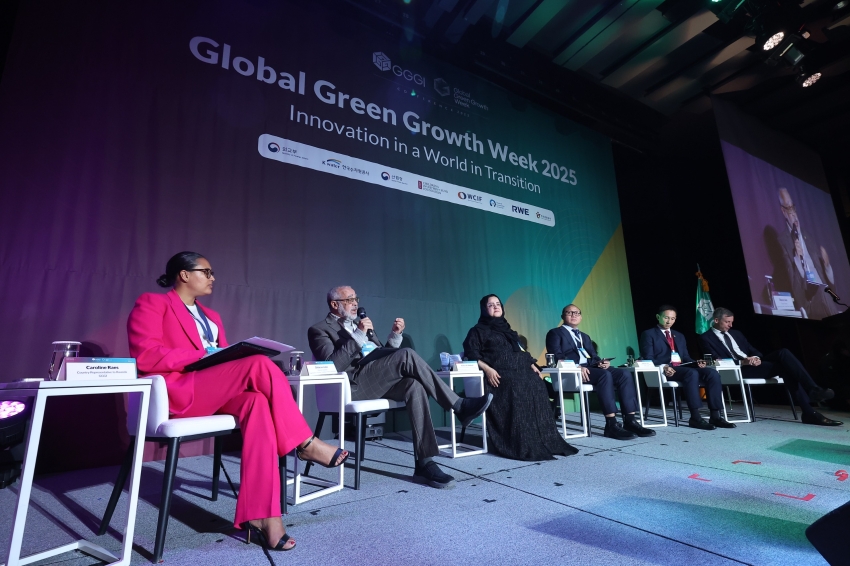Dr. Jules was accompanied by the OECS Programme Director for Sustainable Energy, Mrs. Judith Ephraim, with additional support from GGGI Caribbean Representative, Mr. Daniel Muñoz-Smith. The delegation engaged in intensive diplomatic, policy, and technical discussions aimed at strengthening the region’s resilience, expanding access to climate finance, and deepening partnerships for innovation and sustainable development.
The mission reinforced the OECS Commission’s commitment to advocating on behalf of its Member States, ensuring that their vulnerabilities, development needs, and strategic priorities remain visible in global policy arenas.
During the week, Dr. Jules participated in several major sessions. At the forum on Mobilising Sustainable Finance in Caribbean and Pacific Small Island Developing States, he underscored the urgency of fairer access to climate finance and called for reforms to global financing rules that have long disadvantaged small islands. He also joined the panel on Advancing Sustainable Artificial Intelligence for Green Growth, where he outlined the region’s interest in harnessing AI to improve education systems, reinforce climate resilience, modernise public administration, and diversify the economy through innovation. In the Joint Assembly and Council Session, the Director General delivered a formal intervention presenting the OECS’ overarching position on global green growth, natural capital management, and the crucial role of innovation in transforming the economies of the Eastern Caribbean.
The OECS delegation also attended a series of bilateral meetings focused on areas considered vital to the region’s future, including sustainable energy, transport modernisation, carbon market development, and artificial intelligence. These engagements involved technical teams from GGGI, the Korea National Artificial Intelligence Research Lab (NAIRL), and the Development Bank for Resilient Prosperity (Nature Bank). According to the delegation, the discussions helped build new pathways for collaboration, capacity building, and funding support that could significantly accelerate sustainable development efforts across OECS Member States.
While in Seoul, the delegation met with the Green Climate Fund (GCF) to discuss the OECS Commission’s progress toward accreditation. The GCF confirmed that the OECS application has advanced to Stage 2, with Board consideration expected in 2026. If approved, the OECS Commission will be able to directly manage up to US$50 million for eligible climate projects, a development expected to greatly expand the region’s capacity to execute large-scale initiatives in climate resilience and economic transformation.
Several major developments emerged from the mission, including ongoing work to establish an OECS–GGGI Artificial Intelligence Collaboration Framework centred on AI applications for climate resilience, governance, and education. Discussions with NAIRL also opened the door for scholarships, internships, and joint research opportunities for OECS youth in advanced AI fields. Regional work has also begun on a carbon pricing and MRV framework to support new economic opportunities for Member States, and talks continued on expanding sustainable mobility initiatives such as e-mobility, low-emission urban transport, and resilient marine transport systems. Additional commitments were made to deepen cooperation on renewable energy transition, with emphasis on microgrids, energy efficiency, and solar technologies for schools and public infrastructure.
Speaking at the end of the mission, Dr. Jules described the outcomes as a turning point for the region’s sustainable development agenda. “The OECS is entering a new era of green transformation, powered by strategic partnerships and driven by innovation. Our engagements in Seoul have opened concrete pathways for climate finance, AI-enabled development, sustainable transport, and renewable energy. These collaborations set the foundation for a resilient, future-ready Eastern Caribbean,” he said.
GGGI Caribbean Representative, Mr. Daniel Muñoz-Smith, expressed confidence in the strengthened partnership between the two institutions, noting, “The outcomes of this mission reaffirm GGGI’s deep commitment to supporting the OECS in accelerating climate-smart development. We look forward to expanding our collaboration across energy, adaptation, AI, and sustainable transport.”
The OECS Commission says it will continue to push for strong representation of its Member States in global forums to ensure that regional priorities remain at the centre of international development decisions.
